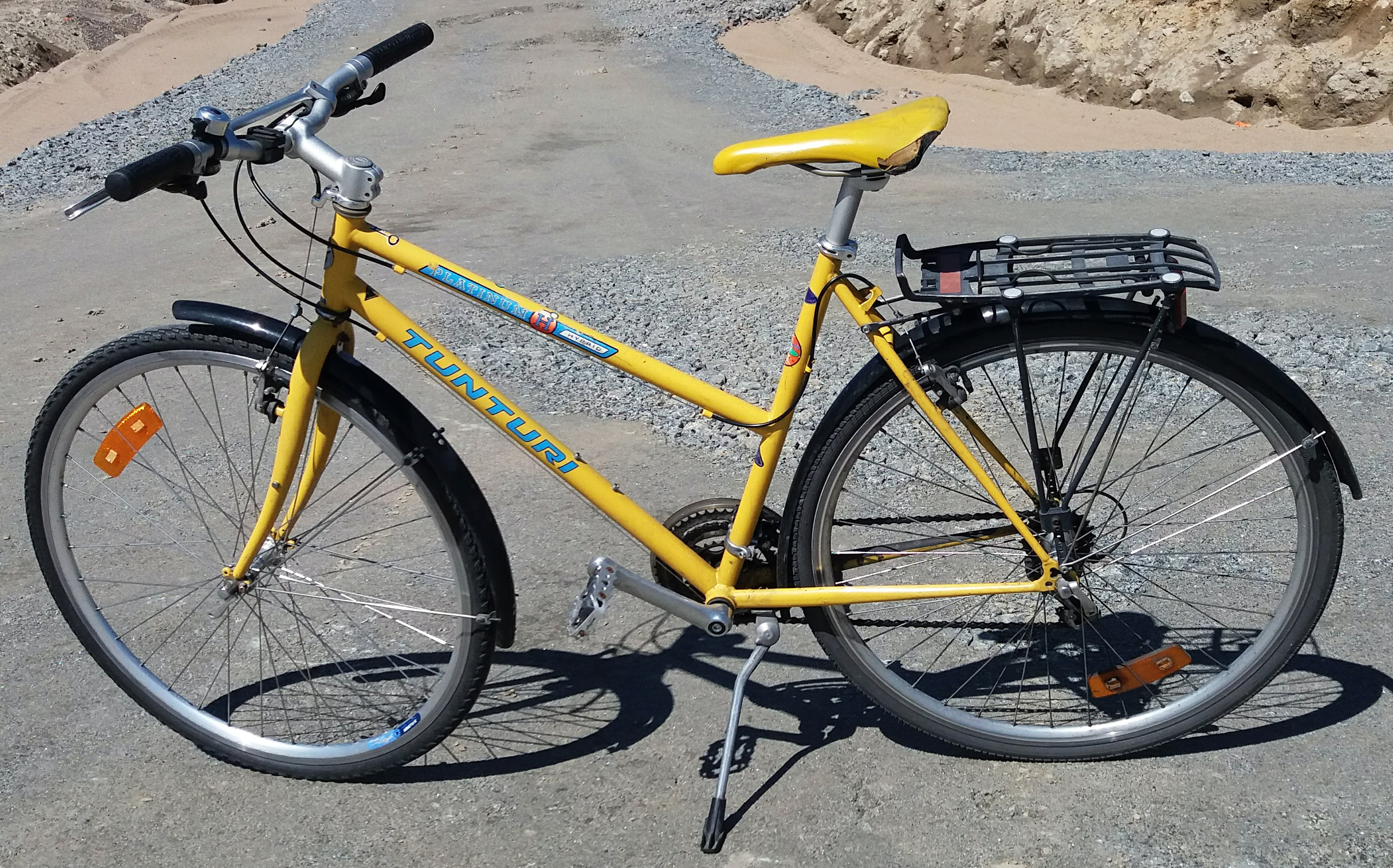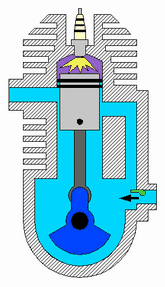|
Tunturi Super Sport
Tunturi Super Sport is one of the latest models made by Tunturi. It replaced the old Tunturi Sport model. Engine used was air-cooled Puch VZ50 N4 with 1.5 HP. There was also 'street' version of Super Sport available known as Tunturi DX, differences being rectangular headlight and plastic panels under and behind the seat. It was made 1977-1987 until Tunturi Tiger S replaced the model. Technical information *engine: Puch VZ50N4 *engine type: 2-stroke A two-stroke (or two-stroke cycle) engine is a type of internal combustion engine that completes a power cycle with two strokes (up and down movements) of the piston during one power cycle, this power cycle being completed in one revolution of t ... *displacement: 49 cm³ *cylinder diameter: 38mm *compression ratio: 8,5:1 *max power: 1,1 kW @ 5000 rpm *carburetor: Bing 85/11/101 *fuel mix: 2,5% *fuel tank capacity: 6,5l *transmission: 4-speed *clutch: wet multiple-disk *voltage: 6v *ignition system: magneto *ignition adva ... [...More Info...] [...Related Items...] OR: [Wikipedia] [Google] [Baidu] |
Tunturi
Tunturi is a Finnish manufacturer of bicycles and fitness equipment. History Tunturi's history began in 1922. The foundations of the Tunturi brand began when brothers Aarne and Eero Harkke set up a small bike shop, ''Pyöräkellari Oy'', in Turku, Finland. The name Tunturi comes from the Finnish word for a fell. Bike repairs were the shop's main focus at first, and then gradually they added some small-scale production, manufacturing Tunturi branded bicycles. The brand was very successful and within a few years the small shop was exchanged for a factory. By the 1950s the Tunturi brand was the domestic market leader in mopeds. Utilising technology and expertise gained from bicycle production, Tunturi expanded into fitness equipment development. In the 1970s, Tunturi became recognized internationally as a producer of fitness equipment. In the 1990s, a strategic decision was made to focus on the production of Tunturi fitness products and Tunturi bicycles. This decision was import ... [...More Info...] [...Related Items...] OR: [Wikipedia] [Google] [Baidu] |
Tunturi Sport
Tunturi is a Finnish manufacturer of bicycles and fitness equipment. History Tunturi's history began in 1922. The foundations of the Tunturi brand began when brothers Aarne and Eero Harkke set up a small bike shop, ''Pyöräkellari Oy'', in Turku, Finland. The name Tunturi comes from the Finnish word for a fell. Bike repairs were the shop's main focus at first, and then gradually they added some small-scale production, manufacturing Tunturi branded bicycles. The brand was very successful and within a few years the small shop was exchanged for a factory. By the 1950s the Tunturi brand was the domestic market leader in mopeds. Utilising technology and expertise gained from bicycle production, Tunturi expanded into fitness equipment development. In the 1970s, Tunturi became recognized internationally as a producer of fitness equipment. In the 1990s, a strategic decision was made to focus on the production of Tunturi fitness products and Tunturi bicycles. This decision was impo ... [...More Info...] [...Related Items...] OR: [Wikipedia] [Google] [Baidu] |
Puch
Puch () is a manufacturing company located in Graz, Austria. The company was founded in 1899 by the industrialist Johann Puch and produced automobiles, bicycles, mopeds, and motorcycles. It was a subsidiary of the large Steyr-Daimler-Puch conglomerate. History Foundation From 1889 Johann Puch (1862–1914) worked as an agent for Humber vehicles and manufacturer of ''Styria'' safety bicycles in a small workshop in Graz and in 1890 he founded his first company, Johann Puch & Comp., employing 34 workers. Cyclists like Josef Fischer, winning the first edition of Paris–Roubaix in 1896, popularized ''Styria'' bicycles which were even exported to England and France. By 1895, Puch already employed more than 300 workers producing about 6000 bikes a year. In 1897 Puch left the company after a dispute with his business partners. Two years later he founded the First Styrian Bicycle Factory AG (''Erste Steiermärkische Fahrradfabrik AG'') in Graz. Puch's company became successful throu ... [...More Info...] [...Related Items...] OR: [Wikipedia] [Google] [Baidu] |
Tunturi Tiger S
Tunturi is a Finnish manufacturer of bicycles and fitness equipment. History Tunturi's history began in 1922. The foundations of the Tunturi brand began when brothers Aarne and Eero Harkke set up a small bike shop, ''Pyöräkellari Oy'', in Turku, Finland. The name Tunturi comes from the Finnish word for a fell. Bike repairs were the shop's main focus at first, and then gradually they added some small-scale production, manufacturing Tunturi branded bicycles. The brand was very successful and within a few years the small shop was exchanged for a factory. By the 1950s the Tunturi brand was the domestic market leader in mopeds. Utilising technology and expertise gained from bicycle production, Tunturi expanded into fitness equipment development. In the 1970s, Tunturi became recognized internationally as a producer of fitness equipment. In the 1990s, a strategic decision was made to focus on the production of Tunturi fitness products and Tunturi bicycles. This decision was import ... [...More Info...] [...Related Items...] OR: [Wikipedia] [Google] [Baidu] |
2-stroke
A two-stroke (or two-stroke cycle) engine is a type of internal combustion engine that completes a power cycle with two strokes (up and down movements) of the piston during one power cycle, this power cycle being completed in one revolution of the crankshaft. A four-stroke engine requires four strokes of the piston to complete a power cycle during two crankshaft revolutions. In a two-stroke engine, the end of the combustion stroke and the beginning of the compression stroke happen simultaneously, with the intake and exhaust (or scavenging) functions occurring at the same time. Two-stroke engines often have a high power-to-weight ratio, power being available in a narrow range of rotational speeds called the power band. Two-stroke engines have fewer moving parts than four-stroke engines. History The first commercial two-stroke engine involving cylinder compression is attributed to Scottish engineer Dugald Clerk, who patented his design in 1881. However, unlike most later two-st ... [...More Info...] [...Related Items...] OR: [Wikipedia] [Google] [Baidu] |
Tunturi Motorcycles
Tunturi is a Finland, Finnish manufacturer of bicycles and fitness equipment. History Tunturi's history began in 1922. The foundations of the Tunturi brand began when brothers Aarne and Eero Harkke set up a small bike shop, ''Pyöräkellari Oy'', in Turku, Finland. The name Tunturi comes from the Finnish word for a fell. Bike repairs were the shop's main focus at first, and then gradually they added some small-scale production, manufacturing Tunturi branded bicycles. The brand was very successful and within a few years the small shop was exchanged for a factory. By the 1950s the Tunturi brand was the domestic market leader in mopeds. Utilising technology and expertise gained from bicycle production, Tunturi expanded into fitness equipment development. In the 1970s, Tunturi became recognized internationally as a producer of fitness equipment. In the 1990s, a strategic decision was made to focus on the production of Tunturi fitness products and Tunturi bicycles. This decision w ... [...More Info...] [...Related Items...] OR: [Wikipedia] [Google] [Baidu] |
Standard Motorcycles
Standard may refer to: Symbols * Colours, standards and guidons, kinds of military signs * Standard (emblem), a type of a large symbol or emblem used for identification Norms, conventions or requirements * Standard (metrology), an object that bears a defined relationship to a unit of measure used for calibration of measuring devices * Standard (timber unit), an obsolete measure of timber used in trade * Breed standard (also called bench standard), in animal fancy and animal husbandry * BioCompute Standard, a standard for next generation sequencing * ''De facto'' standard, product or system with market dominance * Gold standard, a monetary system based on gold; also used metaphorically for the best of several options, against which the others are measured * Internet Standard, a specification ratified as an open standard by the Internet Engineering Task Force * Learning standards, standards applied to education content * Standard displacement, a naval term describing the weig ... [...More Info...] [...Related Items...] OR: [Wikipedia] [Google] [Baidu] |



